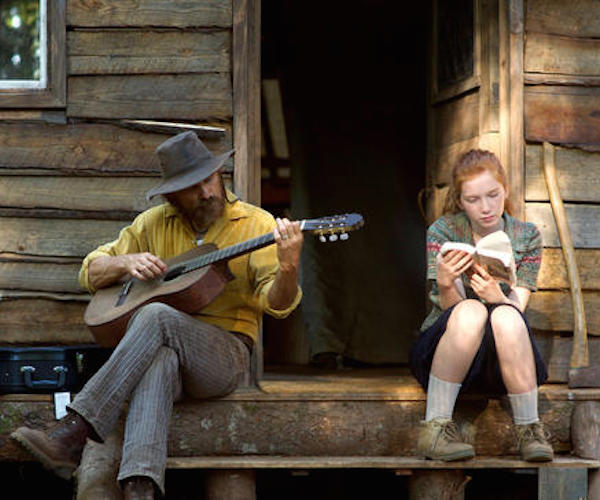Film Review: “Captain Fantastic” — Living Well Off the Grid
Until its closing scenes, Captain Fantastic takes a complex look at independence versus dependence, the wisdom of bucking the system or joining in.
Captain Fantastic written and directed by Matt Ross. Screening at the Kendall Square Cinema, Cambridge, MA and Coolidge Corner Theatre, Brookline, MA.

(l to r) Viggo Mortensen and Annalise Basso in “Captain Fantastic.” Photo: Wilson Webb / Bleecker Street; from EPK.tv.
By Paul Dervis
Few films today ask questions without easy answers. Even fewer create characters that are neither good nor bad, feature stories without clearly designated protagonists or antagonists. This film tries to create a more complex fictional world.
Sometimes it works.
Viggo Mortensen is Ben, a latter-day hippie married to a lawyer dropout. They have a bushel of kids, each of which is given a distinctive name. The family lives off the land in the woods of Oregon, where it has tried to set up a version of Utopia. But wife Leslie (Trin Miller) has been struggling with bipolar issues. Against his better judgment, Ben sends her back to her fat-cat parents in New Mexico where she can receive treatment. Left alone with his brood, Ben approaches parenting by putting the kids through a series of rigorous survivalist tests by day and dense academic exercises by night. They are all quick learners, but they miss their mother deeply.
When Ben leaves the jump camp to check in on Leslie, he finds out she committed suicide the night before. Leslie’s father (Frank Langella) blames Ben for his daughter’s death and threatens him with arrest if he shows up for the funeral. But the children need to see their mother one more time; they are Buddhists who believe in cremation, not burial. So the clan all board their ancient bus and travel down the continent.
What awaits them poses dark and thought-provoking questions about their life choices.
Over a thirty year career, Mortensen has developed into one of our most intense film actors. Here he is called on to carry a movie on his massive shoulders. He easily portrays a ‘mountain man’ who is a jack-of-all-trades and then some. He can scale sheer cliffs and teach his young son to kill a deer with his bare hands (and a knife). The guy can also council his eight year old daughter on the hidden meanings in the writings of Herman Melville. Not only is Mortensen convincing, but he is so comfortable in the role that his uber-organic way of life begins to look attractive .. and there is the dilemma. Ben’s ‘perfect’ world has not been ideal at all.
His oldest son Bo (a haunting performance by George MacKay), the one who killed the deer, has applied to attend colleges behind his back. And he’s been accepted into four Ivy League schools. But Bo knows nothing about life in the real world. He kisses a girl in a trailer park during the journey south and then thinks it makes sense to propose marriage. His idea of popular music is Glenn Gould and he’s never played a video game. A younger son, Rellian, blames Ben for his mother’s suicide and steadfastly demands to leave the family and live with his grandparents.
Ben’s clan seems to be falling apart. And, apparently filled with self doubt, Ben acquiesces to his father-in-law’s demands.
Or does he?
Captain Fantastic has been partly inspired by two films from the 1980s. Like Mosquito Coast, the male protagonist is a seemingly brilliant man who is disenchanted with the ‘real world’ and is convinced that extreme isolation will give his offspring a fuller life. Even greater parallels can be found with Running on Empty. The family in that story was ‘off the grid’ for completely different reasons. Judd Hirsch plays a former Weatherman who had been involved in a bombing in the late 1960s. But the effect his decision has on the son is almost identical. The young man in that story, played by River Phoenix, is accepted into Juilliard, but to attend he must leave his family forever.
Up until its closing scenes, Captain Fantastic eschews the obvious in order to explore deeper and more involving debates about the values of independence and dependence, the wisdom of bucking the system or joining in. Unfortunately, director/writer Matt Ross chickens out at the end, apparently surrendering to the current demand that audiences be served sweet reassurance. And that is a shame. But a lame conclusion does not undo the film’s admirable efforts to take on irresolvable conflicts.
Paul Dervis has been teaching drama in Canada at Algonquin College as well as the theatre conservatory Ottawa School of Speech & Drama for the past 15 years. Previously he ran theatre companies in Boston, New York, and Montreal. He has directed over 150 stage productions, receiving two dozen awards for his work. Paul has also directed six films, the most recent being 2011’s The Righteous Tithe

Nice review. Here’s mine, from a different perspective. https://apotlucklife.com/2016/07/23/captain-fantastic-homeschooling-stereotypes-and-the-man/
You missed that this is also playing the The Venue in Lexington. Thanks.